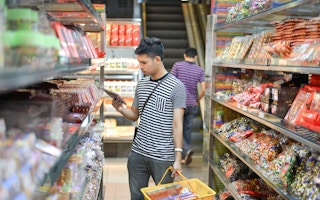The acrid smoke from forest fires in Indonesia wreaked havoc across Southeast Asia for much of September and October this year, causing flights to be grounded, schools to be closed, and major events to be cancelled.
In Indonesia, the haze pollution took 20 lives and resulted in more than half a million people suffering respiratory illnesses.
Many have blamed Indonesia’s forestry sector - mainly palm oil and timber - for the problem. Rising demand for both paper and palm oil products is fuelling sectors’ expansion.
Many land owners are resorting to burning land for plantations as this is one of the cheapest methods, but this burning is often illegal and also threatens biodiversity.
This unsustainable way of producing palm oil, paper, and wood has sparked a search among consumers for “haze-free” products - meaning, it is made of raw materials which are free of deforestation and illegal burning.
At the peak of the haze crisis in October, the Singapore Environment Council (SEC) started a movement among paper companies, manufacturers, and retailers to publicly declare that they did not use pulp and paper from companies which were suspected to be responsible for the haze by the city-state’s National Environment Agency (NEA).
It also suspended its eco-label certification, known as the Singapore Green Labelling Scheme (SGLS), for Indonesian firm Asia Pulp and Paper (APP), the subject of an NEA inquiry. This spurred major retailers such as supermarket chain NTUC Fairprice and online marketplace RedMart to pull all APP tissue and paper products from their shelves.
Following these campaigns, SEC in early November announced that it will start certifying palm oil-based products from next February under the SGLS.
It is working with management consultancy EY to develop the certification criteria, and will also seek input from the Roundtable on Sustainable Palm Oil (RSPO), the industry association which endorses responsibly grown palm oil.
Here, SEC executive director Edwin Seah answers some questions about the upcoming scheme.
Why did SEC decide to develop a new product category for palm oil?
From the haze crisis, it has been quite clear that unsustainable practices in oil palm, pulp and paper cultivation are a significant cause of the problem, as a majority of the fires tend to be on such plantations. Palm oil is prevalent across many of the products we use, such as soaps, detergent, and food items.
While Indonesia, the world’s largest producer of palm oil, aims to double its palm oil production by 2020, only about 20 per cent of the global supply of palm oil production is currently certified as sustainable by RSPO. This poses concerns about how sustainable the commodity is.
The Singapore Green Labelling Scheme (SGLS) already certifies sustainable paper. We considered certifying palm oil products back in 2013, but the idea did not come to fruition for many reasons, including a lack of demand from manufacturers, producers and consumers.
However, the recent haze crisis has sensitised the public and companies to the need for sustainable palm oil, which has contributed to the feasibility of certification in this category. Since we formally announced our intention to move into palm oil product certification in November, some manufacturers have started showing interest in this certification.
How will the certification criteria differ from, or add on to RSPO’s certification for sustainable palm oil?
We will be leveraging on the principles and guidelines by RSPO in the development of the certification criteria. SEC is still in stakeholder consultations with RSPO.
Essentially, the SGLS criteria involve a holistic evaluation of the product’s life cycle. Apart from the source of the raw material (where RSPO certification is required), other aspects like packaging and manufacturing processes are also taken into consideration.
These measures are taken so that consumers can be assured of the product’s environmental value and make a conscious decision to purchase the SGLS-certified item.
Given that such a small percentage of the global palm oil supply is RSPO certified today, and few consumer products with the RSPO trademark available in Singapore, how will the scope of SEC’s new palm oil category extend beyond this niche?
The ideal state is to have all products sold here containing significant levels of palm oil to be certified under the SGLS. But it is challenging to get manufacturers to procure and use only certified sustainable palm oil because eco-labelling is largely voluntary. So beyond certifying the brands that already carry the RSPO trademark, SEC hopes to work with larger manufacturers to have their products certified.
Many of the products certified by SEC today – e.g. detergents, hand soaps, and cosmetics – already contain palm oil. Will existing product categories for cosmetics or detergents now require companies to use only RSPO certified palm oil?
The product must contain significant amounts of palm oil and we are in discussion through our stakeholder consultations regarding the definition around what would constitute a significant amount. More details can only be provided at a later stage.

















